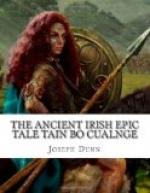[2-2] LU. and YBL. 384-385.
“Thereupon they all set upon him together. They cast their thrice fifty hurl-bats at the poll of the boy’s head. He raises his single toy-staff and wards off the thrice fifty hurlies, [3]so that they neither hurt him nor harm him,[3] [4]and he takes a load of them on his back.[4] Then they throw their thrice fifty balls at the lad. He raises his upper arm and his forearm and the palms of his hands [5]against them[5] and parries the thrice fifty balls, [6]and he catches them, each single ball in his bosom.[6] They throw at him the thrice fifty play-spears charred at the end. The boy raises his little lath-shield [7]against them[7] and fends off the thrice fifty play-staffs, [8]and they all remain stuck in his lath-shield.[8] [9]Thereupon contortions took hold of him. Thou wouldst have weened it was a hammering wherewith each hair was hammered into his head, with such an uprising it rose. Thou wouldst have weened it was a spark of fire that was on every single hair there. He closed one of his eyes so that it was no wider than the eye of a needle. He opened the other wide so that it was as big as the mouth of a mead-cup.[a] He stretched his mouth from his jaw-bones to his ears; he opened his mouth wide to his jaw so that his gullet was seen. The champion’s light rose up from his crown.[9]
[3-3] Stowe.
[4-4] LU. and YBL. 391.
[5-5] Stowe.
[6-6] LU. and YBL. 389.
[7-7] Stowe.
[8-8] LU. and YBL. 387.
[9-9] LU. and YBL. 391-397.
[a] Or, ‘a wooden beaker,’ YBL. 395.
[W.919.] “It was then he ran in among them. He scattered fifty king’s sons of them over the ground underneath him [1]before they got to the gate of Emain.[1] Five[b] of them,” Fergus continued, “dashed headlong between me and Conchobar, where we were playing chess, even on Cennchaem (’Fair-head’) [2]the chessboard of Conchobar,[2] on the mound-seat of Emain. The little boy pursued them to cut them off. [3]Then he sprang over the chessboard after the nine.[3] Conchobar seized the little lad by the wrists. “Hold, little boy. I see ’tis not gently thou dealest with the boy-band.” “Good reason I have,” quoth the little lad. [4]"From home, from mother and father I came to play with them, and they have not been good to me.[4] I had not a guest’s honour at the hands of the boy-troop on my arrival, for all that I came from far-away lands.” “How is that? Who art thou, [5]and what is thy name?"[5] asked Conchobar. “Little Setanta am I, son of Sualtaim. Son am I to Dechtire, thine own sister; and not through thee did I expect to be thus aggrieved.” “How so, little one?” said Conchobar. “Knewest thou not that it is forbidden among the boy-troop, that it is geis for them for any boy to approach them in their land without first claiming his protection from them?” “I knew it not,” said the lad. [W.932.] “Had I known it, I would have been on my guard against them.” “Good, now, ye boys,” Conchobar cried; “take ye upon you the protection of the little lad.” “We grant it, indeed,” they made answer.




